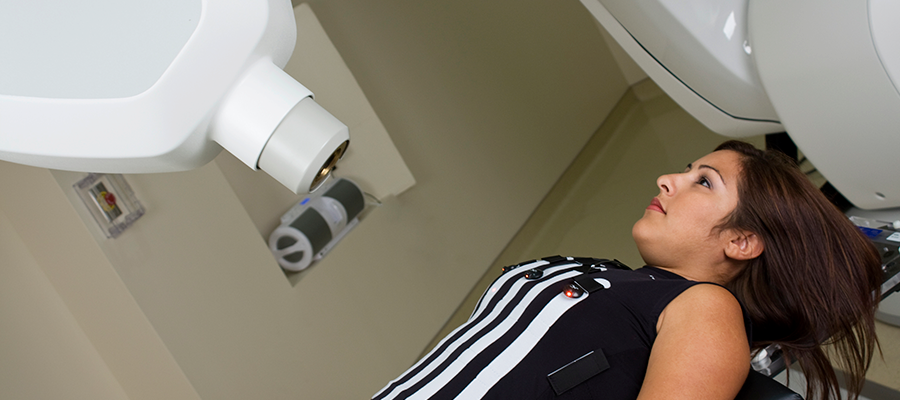Moderate dose radiotherapy effective in EORTC trial for patients with desmoid-type fibromatosis
18 Jul 2013
A phase 2 EORTC trial for patients with inoperable desmoid-type fibromatosis has shown that moderate dose radiotherapy is an effective treatment for patients with such a rare type of tumor. The study results published in Annals of Oncology show that response after radiation therapy is slow, and that continuing regression is seen even after three years.
Dr. Ronald B. Keus, Arnhem Radiotherapy Institute in The Netherlands and Coordinator of this study says, “Although one should still be cautious to use radiotherapy in these young patients, it is important to have shown sound proof of efficacy of radiotherapy in this disease.”
Desmoid-type fibromatosis, a rare form of cancer, is a soft tissue neoplasm that can recur frequently but is not metastatic. The survival prognosis for patients with this disease is good, but due to the frequent recurrences, the consequences of treatment can lower functional outcomes and quality of life. Desmoid-type fibromatosis strikes most frequently in persons between 30 and 40 years of age.
The first line of treatment for patients with desmoid-type fibromatosis is usually surgery, so the phase 2 EORTC 62991-22998 trial was conducted to determine if moderate doses of radiotherapy might improve outcome for patients with inoperable and progressive disease or in cases of expected extensive and mutilating surgery. The primary endpoint was local control rate at three years, and secondary endpoints were objective tumor response, acute toxicity, and late toxicity.
Dr. Winette van der Graaf of the Radboud University Medical Center, Nijmegen, The Netherlands, and Chair of the EORTC Soft Tissue and Bone Sarcoma Group says, ”Desmoid- fibromatosis remains a challenge for surgeons, radiotherapists and medical oncologists. This study has generated valuable information about radiotherapy as an option for patients with desmoid-type fibromatosis which can be discussed at future multidisciplinary sarcoma tumor boards.”
EORTC trial 62991-22998 enrolled 44 patients, 27 females and 17 males, between 2001 and 2008 in twelve sites located in five countries: Belgium, Germany, Poland, The Netherlands, and the United Kingdom. The median age was 39.5 years, and the main tumor sites included trunk 15 (34.1%) and extremities 27 (61.3%). At a median follow up of 4.8 years, the 3-year local control rate was 81.5%.
The best overall response during the first three years was: complete response in six patients (13.6%); partial response in 16 patients (36.4%); stable disease in 18 patients (40.9%); progressive disease in three patients (6.8%). One patient (2.3%) was non-assessable.
After three years two patients improved to complete response and one patient improved to partial response. Five patients developed new lesions during the study, and ten patients experienced mild edema as a late toxicity. Acute grade 3 side effects were limited to skin, mucosal membranes and pain.
EORTC 62991-22998 was coordinated by the EORTC Soft Tissue and Bone Sarcoma Group in collaboration with the EORTC Radiation Oncology Group. This trial was supported by FOCA.
John Bean, PhD
EORTC Medical Science Writer
On behalf of the EORTC Soft Tissue and Bone Sarcoma and Radiation Oncology Groups
Related News
EORTC: Advancing research and treatment for rare cancers
29 Feb 2024
EORTC Fellowship Programme: celebrating more than 20 years of impactful collaboration
22 Feb 2024
Appointment of Malte Peters as EORTC Strategic Alliance Officer
9 Feb 2024
Unique series of workshops in partnership with the European Medicines Agency (EMA)
7 Feb 2024
EORTC launches a prominent clinical trial in older patients with locally advanced (LA) HNSCC (Head and Neck Squamous Cell Carcinoma)
14 Dec 2023
Seven IMMUcan abstracts selected for ESMO Immuno-Oncology Congress 2023
6 Dec 2023
EORTC Quality of Life measures integrated in CDISC
20 Nov 2023
EORTC and Immunocore are collaborating to launch the ATOM clinical trial of tebentafusp in Adjuvant Uveal Melanoma
7 Nov 2023
Treatment with decitabine resulted in a similar survival and fewer adverse events compared with conventional chemotherapy in older fit patients with acute myeloid leukaemia
31 Oct 2023
New results and forthcoming EORTC trials in rare cancers, lung, head and neck, and breast carcinomas presented at ESMO 2023
20 Oct 2023


